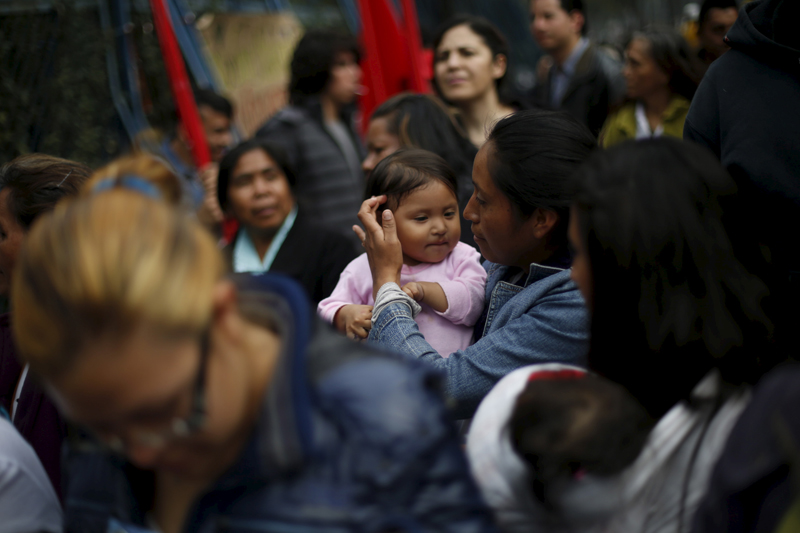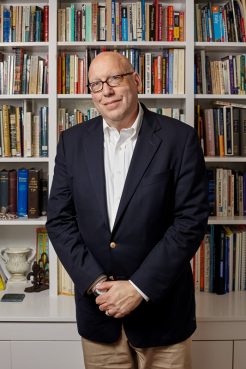
A mother and her baby take part during a demonstration for the rights of refugees migrants near the U.S. embassy building in Mexico City, on December 18, 2015. Photo courtesy of REUTERS/Edgard Garrido
*Editors: This photo may only be republished with RNS-SALKIN-COLUMN, originally transmitted on Jan. 5, 2016.
(RNS) Do you know how to identify a religious person?
It’s not the one who is praying the loudest.
It might not even be the one who spends an inordinate amount of time studying sacred scripture.
It is really quite simple. It is someone who puts his or her religion into action.
I am a Reform rabbi. And I have never been prouder of my movement than I am today.
Here’s why:
READ: My religious experience with Natalie Cole
With all of our national and international conversations about Syrian refugees, the U.S. faces another crisis — immigrants entering this country from Mexico. In particular, we are talking about kids coming into this country without their parents.
So, let’s talk about the Reform Jewish camping movement. I am a product of that camping movement, as are my two sons and hundreds of thousands of other Jews.
The Union for Reform Judaism owns and operates 16 summer camps around North America. It is the largest and, arguably, the most successful Jewish camp program in the world. The number of Jewish camps in general continues to grow — thanks to the activism and support of the Foundation for Jewish Camp.
Jewish summer camping is a major success in this country — and it goes way beyond the borders of the Reform movement. Conservative summer camps, Orthodox summer camps, Zionist summer camps — all contribute immeasurably to American Jewish continuity.
Jewish camps are so successful in creating Jewish identity that they have served as models for other religions and cultures that are interested in fostering continuity and identity among their young people.
A number of years ago, Tibetan Buddhist monks visited Jewish summer camps to learn how to imitate the model and put it to work to strengthen Tibetan Buddhist identity.
So, Jewish summer camps “work.” They create a sense of Jewish identity, community and spirituality. They make Judaism fun. They make kids “more Jewish.”
Are they good for anything else?
As it turns out, yes.
Back to Texas.
READ: Now that Anne Frank’s diary belongs to the world, what will we make of her?
Remember those immigrant children who are entering the United States without their parents?
My old friend, Loui Dobin, is director of the Greene Family Camp, a Reform summer camp near Waco, Texas. He heard about the immigrant kids coming into Texas, and he said (basically): “No sweat. We have room for them.”
And so, nearly 600 immigrant children are enjoying temporary quarters at Greene.
As it turns out, this is not Greene Family Camp’s first time at the moral rodeo (a particularly apt metaphor for Texas). In June 2014, Greene Family Camp welcomed more than 1,000 unaccompanied children who came across the Texas border.
I am trying to imagine what it must be like being a camper at Greene Family Camp, arriving on the first day of summer camp, plunking your duffel bag down on your bunk, and knowing that only a few months ago, an immigrant kid was sleeping there.
And knowing that the camp where you are about to swim, play soccer, sing and hang with your friends actually had a small but powerful role in making the world better.
We were strangers in the land of Egypt, right? So, we do what we can for people who are escaping their own Egypt. Can we fix the whole problem? No. But we can at least do a little bit.
After all, they do call those camps places of “living Judaism.” Places where Judaism is actually lived.
Imagine if other Jewish camps, like the Conservative Ramah camps, did the same thing. And then, Christian camps as well.
You don’t need a new version of the Statue of Liberty sitting on the Texas prairie, with the voice of Emma Lazarus saying: “Give me your tired, your poor, your huddled masses … ”
All you need is the knowledge that you are living your faith.
READ: Controversy grows over Whole Foods CEO’s relationship with disgraced rabbi
Greene Family Camp is not alone. My Reform colleague in Vancouver, Rabbi Dan Moskovitz of Temple Sholom, has inspired his congregation to raise $40,000 to sponsor a Syrian refugee family.

Rabbi Jeffrey Salkin is the spiritual leader of Temple Solel in Hollywood, Fla., and the author of numerous books on Jewish spirituality. Religion News Service photo by Steve Remich
In Phoenix, Rabbi Shmuly Yanklowitz hosted a Syrian refugee family for Thanksgiving.
Why do we need these examples? Because, let’s face it: Religion has been getting a bum rap. A lot of people see what religious fanatics around the world are doing, and they are saying: If that’s what religion is supposed to be, count me out.
Instead, we Jews should be shouting about these Jewish leaders who are walking the walk and talking the talk, the biblical walk and talk, that is.
As an anonymous black Baptist preacher once said: “A religion that ain’t no good on Monday, ain’t no good on Sunday.”
Or, as it turns out, Saturday as well.
(Rabbi Jeffrey K. Salkin is the spiritual leader of Temple Solel in Hollywood, Fla.; the author of numerous books on Jewish spirituality and ethics; and an RNS blogger)




